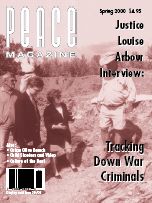
Peace Magazine Spring 2000, page 13. Some rights reserved.
Search for other articles by John Bacher here
The disastrous wars of former Yugoslavia tend to obscure the remarkable peace that has succeeded in the rest of the European continent in the decade following the collapse of the Berlin wall. While peace in Yugoslavia was shattered by triumph of separatists and authoritarian nationalists, it has held together in the rest of Europe because of patient work of moderate democrats. They have successfully worked out compromises based on the principles of cooperative democratic federalism.
The key figure prescribing remedies to avert war is no dashing secret agent nor sinister international financier. He is Max van der Stoel, who since 1991 has served as the High Commissioner on National Minorities for the Organization for Security and Cooperation in Europe (OSCE). Not linked to any right-wing think tank, Max van der Stoel is a veteran leader of the Socialist International, whose members include Canada's New Democratic Party. He served twice as Dutch foreign minister in Labour Party governments in the Netherlands during the mid 1970s and early 1980s.
What is remarkable about this contemporary 75-year-old European social democratic statesman is how van der Stoel's prescriptions for peace in Europe follow closely the views of a turn of the century socialist prophet, Rosa Luxemburg. She denounced separatism unlike such authoritarian socialists as Lenin, and urged social democrats to foster cultural pluralism through "a special law to protect the smaller minorities" of Europe. While respecting calls to assist minority languages, Luxemburg opposed every scheme for the partition of a state along ethnic lines.
Today van der Stoel is bravely following Luxemburg's formulas for a democratic peace based on the respect for minority rights. He challenges both the intolerant in charge of national governments and their extreme national opponents who advocate separatism. To both sides of the ethnic divides of Europe, van der Stoel urges respect for minority rights within the confines of existing national states.
The range of successful and enduring agreements that van der Stoel has encouraged in a brief seven years is astonishing. He persuaded the Turkic-speaking Gagauz people of Moldova to accept the autonomy agreement offered by their federal government. He won better deals for Hungarians in Slovakia and Romania.
Van der Stoel is now urging the government of Macedonia to let its large Albanian community have its own university. This seeks to diffuse a controversy that has resulted in serious disturbance for the past three years since thousands protested over the imprisonment of Fadil Slejmani, dean of the outlawed Tetovo University. This school is funded privately by ethnic Albanians.
One of van der Stoel's biggest successes was achieved in Crimea. Here he helped persuade Crimea's ethnic Russians to accept autonomy within Ukraine rather than seek separation or incorporation into Russia.
One of van der Stoel's biggest challenges has been in the Baltic states. Here he has been in continual tugs of war over proposed citizenship laws requiring ethnic Russians to learn national languages and history. His relative success in moderating such requirements has avoided giving Russian nationalists an excuse to annex these nations at the risk of war. Van der Stoel, for many years, warned of a pending war in Kosovo.
When the Berlin wall came down there were many conflicts in Europe against minorities which could have provided explosive tinder for war. The Russian minority in Crimea, the Turks of Bulgaria, the Hungarians of Romania and Slovakia, the Gagauz of Moldova, the Albanians of Macedonia, and the Russians of the Baltic states all had legitimate and serious grievances against their national governments and could have sparked civil wars or international conflict as happened eventually in Bosnia and Kosovo.
In the former Yugoslavia, peace agreements based on the protection of minority rights and existing national borders were secured only after NATO bombardment and eventual occupation by Russian and American troops.
However, moderation has prevailed in most of the former Communist states of Eastern Europe. Max van der Stoel is helping to achieve Rosa Luxemburg's vision of a peaceful and united multicultural democratic Europe, 60 years after her death.
John Bacher is a frequent contributor to Peace Magazine.

Peace Magazine Spring 2000, page 13. Some rights reserved.
Search for other articles by John Bacher here